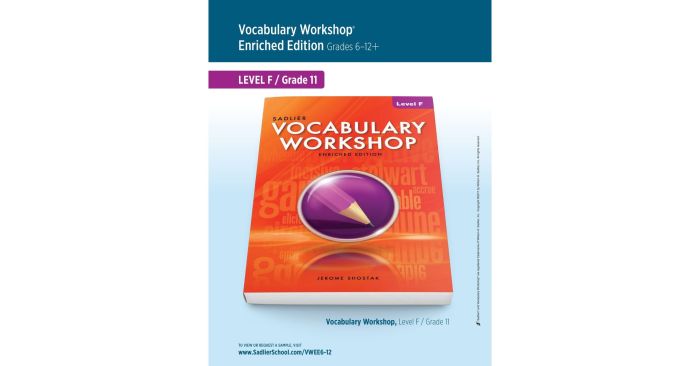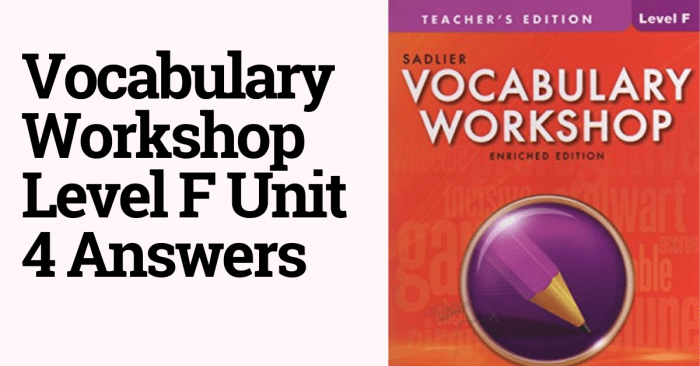Embark on a linguistic journey with Vocabulary Workshop Level F Unit 4, a comprehensive resource designed to elevate your vocabulary prowess. This unit delves into the intricacies of word analysis, contextual understanding, and engaging practice activities, empowering you to master the art of effective communication.
Through a meticulous exploration of etymology, prefixes, suffixes, and root words, you will unravel the hidden meanings and relationships within language. By immersing yourself in real-world examples and exercises, you will cultivate a deep understanding of how words are used in context.
Interactive games, puzzles, and discussions will transform vocabulary practice into an enjoyable and rewarding experience.
Vocabulary Overview

Vocabulary Workshop Level F Unit 4 aims to enhance students’ vocabulary knowledge by introducing them to a set of high-frequency words commonly used in academic and professional contexts. These words are essential for effective communication and comprehension in various settings.
The target vocabulary words for this unit include: elucidate, enigmatic, superfluous, meticulous, judicious, succinct, ubiquitous, and pragmatic.
This unit employs a range of strategies and techniques to teach vocabulary, including word analysis, contextual understanding, and vocabulary practice activities.
Word Analysis, Vocabulary workshop level f unit 4
Word analysis involves examining the etymology and structure of words to understand their meaning and usage. By breaking down words into prefixes, suffixes, and root words, students can gain a deeper understanding of their origins and how they relate to other words.
For example, the word “elucidate” is derived from the Latin word “lucidus,” meaning “clear.” This helps students understand that “elucidate” refers to making something clear or understandable.
Contextual Understanding
Contextual understanding is crucial for vocabulary development. By providing examples of how target vocabulary words are used in sentences and texts, students can see how they are applied in real-world scenarios.
For instance, a sentence using the word “superfluous” could be: “The extra details in the report were superfluous and only served to distract from the main points.”
Vocabulary Practice Activities
Engaging and interactive vocabulary practice activities are essential for reinforcing learning. These activities can range from games and puzzles to discussions and writing exercises.
For example, a crossword puzzle could include clues that require students to use target vocabulary words to complete the puzzle.
Assessment and Evaluation
Effective assessment methods are crucial for evaluating students’ vocabulary knowledge. A variety of methods can be used, including quizzes, essays, and portfolios.
For instance, a quiz could assess students’ ability to define and use target vocabulary words in sentences.
Technology Integration
Technology can enhance vocabulary learning by providing access to interactive resources and online exercises. Apps, websites, and other tools can supplement traditional teaching methods.
For example, an online vocabulary game could allow students to practice using target vocabulary words in a fun and engaging way.
Differentiated Instruction
Differentiated instruction addresses the diverse learning styles and needs of students. By providing differentiated vocabulary activities and resources, teachers can ensure that all learners are supported.
For instance, visual learners may benefit from using flashcards with images and definitions, while auditory learners may prefer listening to podcasts or audio recordings of target vocabulary words.
Questions and Answers: Vocabulary Workshop Level F Unit 4
What is the purpose of Vocabulary Workshop Level F Unit 4?
Vocabulary Workshop Level F Unit 4 aims to enhance vocabulary skills through word analysis, contextual understanding, and engaging practice activities.
How does word analysis help in vocabulary development?
Word analysis provides insights into the etymology, structure, and relationships between words, aiding in the understanding of their meanings and usage.
Why is contextual understanding important for vocabulary development?
Contextual understanding allows learners to observe how words are used in real-world scenarios, promoting their ability to apply them appropriately in various contexts.
What types of practice activities are included in Vocabulary Workshop Level F Unit 4?
The unit offers a range of engaging activities, such as games, puzzles, and discussions, to reinforce vocabulary learning in a fun and interactive manner.

